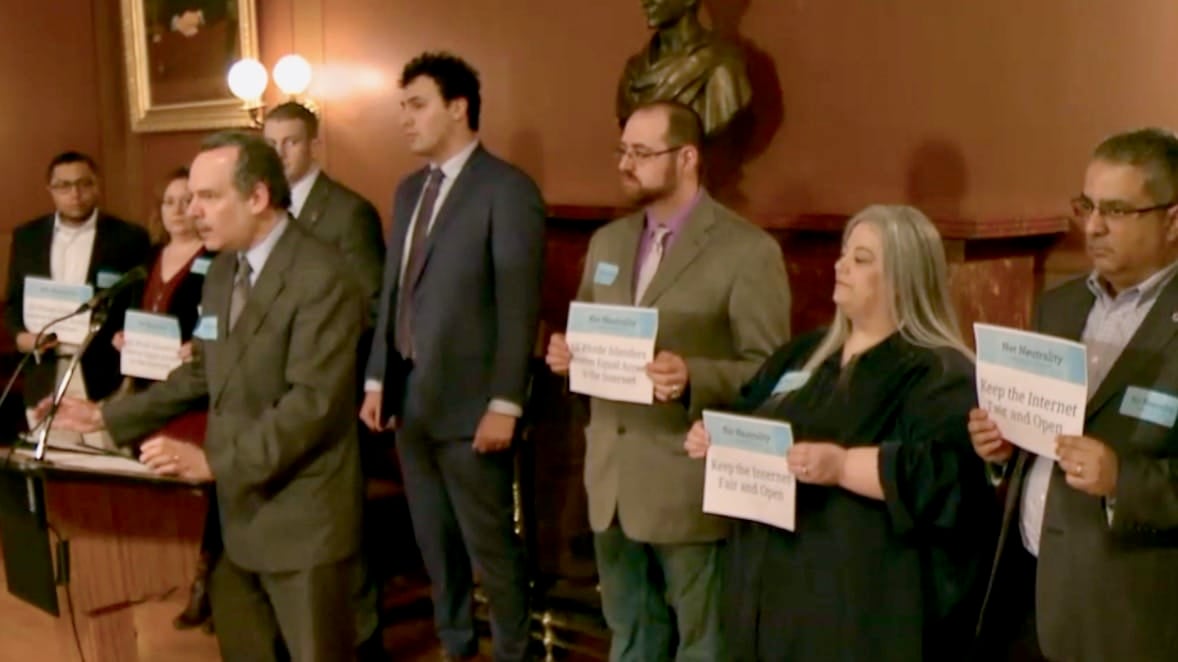Rhode Island considers legislation to combat the loss of net neutrality
Senator Louis DiPalma (Democrat, District 12, Little Compton, Middletown) and Representative Aaron Regunberg (Democrat, District 4, Providence) introduced legislation today to combat the the Federal Communications Commission (FCC)’s recent decision to do away with Net Neutrality. The legislation would require that all Internet access purchased or funded by the state is “provided in an unbiased manner, consistent with net neutrality
February 1, 2018, 6:11 pm
By Steve Ahlquist
Senator Louis DiPalma (Democrat, District 12, Little Compton, Middletown) and Representative Aaron Regunberg (Democrat, District 4, Providence) introduced legislation today to combat the the Federal Communications Commission (FCC)’s recent decision to do away with Net Neutrality.
The legislation would require that all Internet access purchased or funded by the state is “provided in an unbiased manner, consistent with net neutrality principles.”
The legislation focuses on state purchasing because FCC Chairman Ajit Pai’s order also blocked states and municipalities from declaring net neutrality within their own borders. But state purchases for internet service are significant, and such a law would force internet service providers (ISPs) to maintain neutrality if they wish to be eligible for government contracts.
“This is an economic development and consumer protection bill. The internet drives our economy. It’s how we learn. It’s how we search for jobs. It’s how entrepreneurs innovate. For all we know, right now, in a basement somewhere in Rhode Island, a young person could be working on the start-up that could become the next Facebook or Google. But none of that can happen without a free and open internet,” said Representative Regunberg.
The legislation would apply when the state is the purchaser of internet access services, whether for state agencies or for entities to which it provides funding for internet services, such as libraries or any public wi-fi. It would also apply to any agency or organization whose Internet services are provided by state funding, such as grants.
The bill is a national model developed by the American Civil Liberties Union (ACLU). If it is adopted by many states, it would create a vast block of purchasing power that could compel neutrality from ISPs through public contracts.
“While the FCC decision specifically aims to prevent states from defending against this loss of freedom, setting our own standards for state purchasing is a way that Rhode Island can strike back against the loss of net neutrality. States have a lot of buying power, and we can use that power to influence internet access providers to adopt net neutrality principles in order to secure state and local business,” said Senator DiPalma.
“The analogy I like to give is with telephone service, which is how internet service providers were treated the same as until this recent FCC repeal,” said Steven Brown, executive director of the Rhode Island ACLU. “So imagine the phone company barring you from receiving certain phone calls, based on the content of what the person who was on the end of the line was going to tell you. Imagine the phone company requiring you to wait for the phone to ring fifty times before the person on the other end of the line could answer, based solely on who that person was or whether they had paid the company to let you get through to them in two rings.”
“This year we continue a fight that shouldn’t even be a fight: Net Neutrality,” said Nick Inglis, president of the Information Coalition, “Since the inception of the Internet equal access was an assumed right of everyone on the platform.”
Kieran Ayton and Julie Holden, president and vice president of the Rhode Island Library Association (RILA) delivered a joint statement in support of the legislation.
Members of the coalition include the Rhode Island affiliate of the American Civil Liberties Union, Common Cause Rhode Island, the Rhode Island Library Association, College Democrats of Rhode Island, Demand Progress Action, High School Democrats of Rhode Island, Millennial Rhode Island, Our Revolution Rhode Island, Providence Student Union, University of Rhode Island Democrats, Young Democrats of Rhode Island, Rhode Island Working Families Party and Brown Progressive Action Committee.
The bills lead sponsors in the Rhode Island House of Representatives are: Representatives Aaron Regunberg, Jeremiah O’Grady, Kathy Fogarty, Edith Ajello, Blake Filippi, Brian Patrick Kennedy, Marvin Abney, Joseph Shekarchi, Patricia Serpa and Kenneth Marshall.
The bills lead sponsors in the Rhode Island Senate are: Senators Louis DiPalma, Ryan Pearson, Jeanine Calkin, Gayle Goldin and Joshua Miller.
Uprise RI is entirely supported by donations and advertising. Every little bit helps:







